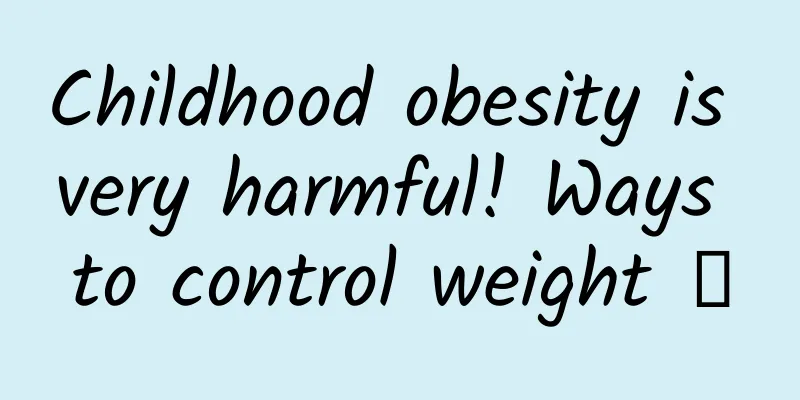Childhood obesity is very harmful! Ways to control weight →

|
"Our next generation is facing the threat of obesity and metabolic diseases." Professor Fu Junfen of the Children's Hospital Affiliated to Zhejiang University School of Medicine said at the annual summary and project promotion meeting of "Demonstration Research on the Mechanism of Pathogenesis and Precision Prevention and Treatment of Obesity and Metabolic Diseases in Children" on February 18. Led by Professor Fu Junfen's team, 18 medical centers across the country, including Fudan University Children's Hospital, Beijing Children's Hospital, and Tianjin Medical University General Hospital, participated in the epidemiological survey of more than 230,000 children and adolescents across the country. The results showed that: Over 10 years The problem of obesity among children and adolescents is becoming increasingly prominent! Childhood obesity has tripled! Research data shows that there are more than 1.55 billion obese children in the world, 120 million of whom are in China. 70% to 80% of childhood obesity can continue into adulthood, increasing the risk of diabetes, cardiovascular and cerebrovascular diseases, and tumors by 2 to 5 times. Obesity is also a risk factor for precocious puberty and early development, and may affect the development of reproductive organs and fertility. 01 Childhood Obesity More harmful than "middle-aged obesity"! In 2017, the "China Childhood Obesity Report" published by the Chinese Nutrition Society showed that the health risks associated with childhood obesity can continue into adulthood. After adulthood, the risk of developing diabetes in obese children is 2.7 times that of children with normal weight. Compared with people with normal weight, people who are obese from childhood to adulthood have a 4.3 times higher risk of developing diabetes and a 9.5 times higher risk of developing metabolic syndrome. Childhood obesity is actually more harmful than adult obesity! 1. Early hardening of blood vessels A study published in The Lancet Child & Adolescent Health in 2019 showed that the arteries of obese adolescents begin to become stiff in their teens. 2. Susceptibility to fatty liver A survey conducted by the Epidemiology Research Office of the Capital Institute of Pediatrics on 1,500 primary and secondary school students in Beijing showed that the detection rate of fatty liver in obese children was as high as 10.2%, 51 times that of children with normal weight, and the detection rate in severely obese children was as high as over 40%. 3. Precocious puberty Overweight and obesity are important causes of precocious puberty in children. One of the major hazards of precocious puberty is that children stop growing early, resulting in shorter adult height. If not treated in time, it will also have many adverse effects on children's psychological development, further education, employment and marriage. 4. Affect sexual function Children aged 7 to 12 who are seriously overweight are in the early stages of puberty, and the accumulation of body fat can lead to endocrine disorders, pituitary gland fatification, and directly cause delayed development of the reproductive system. The incidence of obesity in boys is over 90%, and in girls over 50%. When such boys grow up, they are likely to have small genitals, low libido, and even sexual dysfunction, and cannot have a normal sex life with their partners; girls will have sexual dysplasia, menstrual disorders, and in severe cases, lifelong infertility. 02 Don’t let your children get too fat! We always hear the older generation say: "A fat child is blessed", "A fat boy is healthy", "Being able to eat is a blessing, it's okay for children to eat more", "A fat and white child is well raised"... In fact, such a concept of parents is actually harmful to their children! Obesity is a predisposing factor for various diseases, and this is true for both adults and children! In 2021, the First Affiliated Hospital of Zhejiang University admitted an 11-year-old patient named Xuanxuan (pseudonym), who was a little over 1.4 meters tall and weighed 110 kilograms. He suffered from severe acute pancreatitis. It is reported that the child ate 3 bowls of rice and a large table of vegetables and meat at dinner one day. He was so full that he "couldn't eat any more". Not long after finishing the meal, he began to have stomach pain, which became more and more severe. He also had symptoms of nausea and vomiting. Later, he went to the hospital for a check-up and found that Xuanxuan's blood amylase, lipase and other indicators exceeded the normal level by more than 3 times, and his creatinine also greatly exceeded the normal value. Li Tong, deputy director of the Department of Critical Care Medicine and director of the ICU at the Zhejiang University First Hospital, said, "After completing various examinations, we diagnosed him with severe acute pancreatitis, and he had already developed complications such as acute kidney injury and respiratory failure. At the same time, the examination results showed that the child had severe fatty liver." Another 11-year-old boy was diagnosed with severe liver cirrhosis due to his uncontrolled diet. In 2020, Shenzhen Third People's Hospital admitted an 11-year-old patient with liver cirrhosis. As early as one year ago, the 10-year-old boy had moderate fatty liver. In May 2020, the little boy returned to the hospital for a follow-up visit. The pathology report showed that he had non-alcoholic fatty hepatitis with cirrhosis, and the cirrhosis grade was S3-4, which was severe cirrhosis. The family never thought that an 11-year-old child would have severe cirrhosis. According to the parents, the child has had a good appetite since childhood. He can eat 2 or 3 bowls of white rice at a meal. He likes to eat meat dishes such as braised pork, and also likes to eat foods with a lot of oil and salt. He will not stop until he is full at every meal. As a result, the child is getting fatter and fatter. 03 Six national departments jointly issued a reminder: Pay attention to childhood obesity! On October 16, 2020, the National Health Commission, the Ministry of Education, the State Administration for Market Regulation and other six departments issued the "Implementation Plan for the Prevention and Control of Obesity in Children and Adolescents", proposing that from 2020 to 2030, the average annual increase in the overweight and obesity rates of children and adolescents aged 0 to 18 in some regions should be 70% above the baseline. At the same time, the plan also announced the prevalence of overweight and obesity among children and adolescents in different regions across the country.[9] So, how should children control their weight? The "Core Information and Interpretation of China's Youth Health Education (2018 Edition)" issued by the National Health Commission gives very specific suggestions: suggestion: 1. Ensure three meals a day, at regular times and in regular amounts, and do not eat too fast. 2. Eat breakfast every day to ensure that the three meals are nutritious, balanced and in appropriate quantities. 3. Eat a variety of foods. Try to have cereals and vegetables at every meal, eat fruit every day, and consume fish, poultry, meat and eggs in moderation. 4. Ensure daily intake of 300 grams of milk or dairy products and eat soy products regularly. 5. Choose snacks wisely. Between meals, you can choose appropriate amounts of fruits, nuts, yogurt and other foods as snacks. 6. Do not be picky about food or diet, and do not overeat. 7. Eat less fried foods and high-fat foods. 8. Eat a light diet and eat less pickled and smoked foods. 9. Drink enough water, preferably boiled water, and drink less or no sugary drinks. 10. During breaks, get up from your seat and move around appropriately. 11. Exercise methods should be diversified and should include appropriate aerobic exercise, resistance exercise, flexibility training, etc. 12. Perform at least 1 hour of moderate-intensity exercise or above every day (with shortness of breath, increased heart rate, and feeling unable to speak easily during exercise). |
<<: How to prevent H1N1 virus scientifically? Doctors remind us
Recommend
Causes of darker nipples
When women reach a certain age, their nipples wil...
1+1>2: Can co-infection of influenza and COVID-19 aggravate the patient's condition?
With the onset of the flu epidemic in southern my...
What should women do when they have dysmenorrhea?
As most of our female compatriots know, we have “...
What anti-inflammatory drugs are good for pelvic infection?
Pelvic infection refers to the inflammation that ...
Precautions for episiotomy during childbirth
Many female friends who are giving birth will enc...
Can I eat lychees during my period?
Lychees are very easy to peel, and their flesh is...
Breastfeeding, breast lumps, pain when pressed
If the symptoms become more severe, surgical trea...
How high is a latex pillow? What should I do if the latex pillow is too high?
Latex pillows are made from the sap of rubber tre...
What should girls do if they are ugly and feel inferior?
Today's society is an age where looks matter....
What should I do if my throat gets inflamed during confinement?
When women are in confinement, their bodies are i...
What does the ovulation test show if you are pregnant? You will understand after reading it
Once a woman becomes pregnant, she will no longer...
Is endometrial thickness 17 serious?
The normal endometrial thickness is generally no ...
Six hormones to see ovarian function
We all know that many women with gynecological di...









